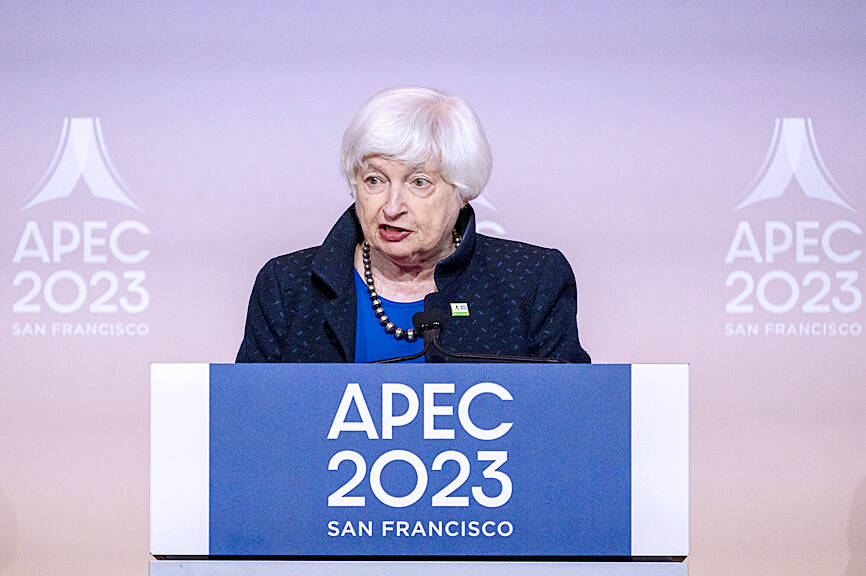US Secretary of the Treasury Janet Yellen said she told her Chinese counterpart that Beijing’s heavy financial support for certain industries could pose a threat to other nations, as trade tensions simmer between the world’s largest economies.
Speaking at a news conference in San Francisco on Monday following a day of meetings between finance ministers from across the Pacific Rim, Yellen said she discussed “issues of oversupply” with Chinese Vice Premier He Lifeng (何立峰).
“We did talk about issues of oversupply that have arisen and could arise in the future in industries that China is investing in very heavily,” Yellen said.

Photo: Bloomberg
“I do consider that a risk,” and Chinese officials should understand the US’ concerns that some of this investment could result in overcapacity, she said.
Yellen added that she discussed China’s growth slowdown with APEC ministers, who agreed that it presented a “downside risk to the economic outlook” particularly for member nations with strong trade ties to Beijing.
China and the US are committed to creating a “level playing field” for companies and workers in their nations, said statements the two sides released after their meeting at the start of the conference.
Finance officials held discussions in California ahead of a gathering of leaders from their nations later this week. The APEC summit is to also provide an opportunity for a much-anticipated meeting of US President Joe Biden and Chinese President Xi Jinping (習近平).
Yellen, who hosted her counterparts in the California city, said the finance ministers’ meeting allowed the group “to cement progress on key priorities: from monitoring macroeconomic and financial developments in the region and globally, to advancing our approaches to regulation of digital assets, sustainable finance, and inclusive growth-oriented policies.”
Chinese overcapacity in some sectors has been an issue for years, with the EU, Japan, the US and other nations working together in various formats to try to reduce this in sectors such as steel. The EU recently opened an investigation into Chinese subsidies for electric vehicles after Chinese exports jumped.

Hon Hai Precision Industry Co (鴻海精密) yesterday said that its research institute has launched its first advanced artificial intelligence (AI) large language model (LLM) using traditional Chinese, with technology assistance from Nvidia Corp. Hon Hai, also known as Foxconn Technology Group (富士康科技集團), said the LLM, FoxBrain, is expected to improve its data analysis capabilities for smart manufacturing, and electric vehicle and smart city development. An LLM is a type of AI trained on vast amounts of text data and uses deep learning techniques, particularly neural networks, to process and generate language. They are essential for building and improving AI-powered servers. Nvidia provided assistance

DOMESTIC SUPPLY: The probe comes as Donald Trump has called for the repeal of the US$52.7 billion CHIPS and Science Act, which the US Congress passed in 2022 The Office of the US Trade Representative is to hold a hearing tomorrow into older Chinese-made “legacy” semiconductors that could heap more US tariffs on chips from China that power everyday goods from cars to washing machines to telecoms equipment. The probe, which began during former US president Joe Biden’s tenure in December last year, aims to protect US and other semiconductor producers from China’s massive state-driven buildup of domestic chip supply. A 50 percent US tariff on Chinese semiconductors began on Jan. 1. Legacy chips use older manufacturing processes introduced more than a decade ago and are often far simpler than

STILL HOPEFUL: Delayed payment of NT$5.35 billion from an Indian server client sent its earnings plunging last year, but the firm expects a gradual pickup ahead Asustek Computer Inc (華碩), the world’s No. 5 PC vendor, yesterday reported an 87 percent slump in net profit for last year, dragged by a massive overdue payment from an Indian cloud service provider. The Indian customer has delayed payment totaling NT$5.35 billion (US$162.7 million), Asustek chief financial officer Nick Wu (吳長榮) told an online earnings conference. Asustek shipped servers to India between April and June last year. The customer told Asustek that it is launching multiple fundraising projects and expected to repay the debt in the short term, Wu said. The Indian customer accounted for less than 10 percent to Asustek’s

Gasoline and diesel prices this week are to decrease NT$0.5 and NT$1 per liter respectively as international crude prices continued to fall last week, CPC Corp, Taiwan (CPC, 台灣中油) and Formosa Petrochemical Corp (台塑石化) said yesterday. Effective today, gasoline prices at CPC and Formosa stations are to decrease to NT$29.2, NT$30.7 and NT$32.7 per liter for 92, 95 and 98-octane unleaded gasoline respectively, while premium diesel is to cost NT$27.9 per liter at CPC stations and NT$27.7 at Formosa pumps, the companies said in separate statements. Global crude oil prices dropped last week after the eight OPEC+ members said they would